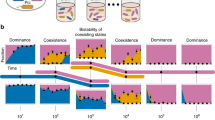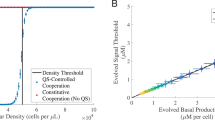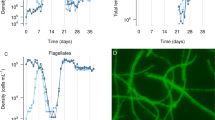Abstract
replying to S. Våge, J. E. Storesund & T. F. Thingstad Nature 499, 10.1038/nature12387 (2013)
In the debate about top-down versus bottom-up control, most would argue that both are important. The most probable scenario is that in the absence of high rates of transport, the equilibrium between these competing processes determines bacterial abundance. In their Brief Communication Arising, Våge and co-workers1 respond to our Letter2, arguing the case for defense specialism. ‘Defence specialism’ is not synonymous with ‘defence’. Because of the prevalence of viruses, it is probable that most bacteria have acquired defences against predation. ‘Defence specialism’ refers to success by defence, in the sense that a cell might allocate a large proportion of its resources to defence and thereby become successful.
This is a preview of subscription content, access via your institution
Access options
Subscribe to this journal
Receive 51 print issues and online access
$199.00 per year
only $3.90 per issue
Buy this article
- Purchase on Springer Link
- Instant access to full article PDF
Prices may be subject to local taxes which are calculated during checkout
Similar content being viewed by others
References
Våge, S., Storesund, J. E. & Thingstad, T. F. SAR11 viruses and defensive host strains. Nature 499, http://dx.doi.org/10.1038/nature12387 (2013)
Zhao, Y. et al. Abundant SAR11 viruses in the ocean. Nature 494, 357–360 (2013)
Grote, J. et al. Streamlining and core genome conservation among highly divergent members of the SAR11 clade. mBio 3, e00252–12 (2012)
Lennon, J. T. et al. Is there a cost of virus resistance in marine cyanobacteria? ISME J. 1, 300–312 (2007)
Malmstrom, R. R., Kiene, R. P., Cottrell, M. T. & Kirchman, D. L. Contribution of SAR11 bacteria to dissolved dimethylsulfoniopropionate and amino acid uptake in the North Atlantic ocean. Appl. Environ. Microbiol. 70, 4129–4135 (2004)
Vergin, K. L. et al. High-resolution SAR11 ecotype dynamics at the Bermuda Atlantic Time-series Study site by phylogenetic placement of pyrosequences. ISME J. 7, 1322–1332 (2013)
Tripp, H. J. et al. SAR11 marine bacteria require exogenous reduced sulphur for growth. Nature 452, 741–744 (2008)
Tripp, H. J. et al. Unique glycine-activated riboswitch linked to glycine–serine auxotrophy in SAR11. Environ. Microbiol. 11, 230–238 (2009)
Sun, J. et al. One carbon metabolism in SAR11 pelagic marine bacteria. PLoS ONE 6, e23973 (2011)
Sowell, S. M. et al. Transport functions dominate the SAR11 metaproteome at low-nutrient extremes in the Sargasso Sea. ISME J. 3, 93–105 (2008)
Sowell, S. M. et al. Proteomic Analysis of Stationary Phase in the Marine Bacterium ‘Candidatus Pelagibacter ubique’. Appl. Environ. Microbiol. 74, 4091–4100 (2008)
Author information
Authors and Affiliations
Corresponding author
Rights and permissions
About this article
Cite this article
Giovannoni, S., Temperton, B. & Zhao, Y. Giovannoni et al. reply. Nature 499, E4–E5 (2013). https://doi.org/10.1038/nature12388
Published:
Issue Date:
DOI: https://doi.org/10.1038/nature12388
This article is cited by
-
Isolation of phages infecting the abundant freshwater Actinobacteriota order ‘Ca. Nanopelagicales’
The ISME Journal (2023)
-
Dynamics of actively dividing prokaryotes in the western Mediterranean Sea
Scientific Reports (2022)
-
Efficient dilution-to-extinction isolation of novel virus–host model systems for fastidious heterotrophic bacteria
The ISME Journal (2021)
-
Genetically similar temperate phages form coalitions with their shared host that lead to niche-specific fitness effects
The ISME Journal (2020)
-
Lysogenic host–virus interactions in SAR11 marine bacteria
Nature Microbiology (2020)
Comments
By submitting a comment you agree to abide by our Terms and Community Guidelines. If you find something abusive or that does not comply with our terms or guidelines please flag it as inappropriate.



